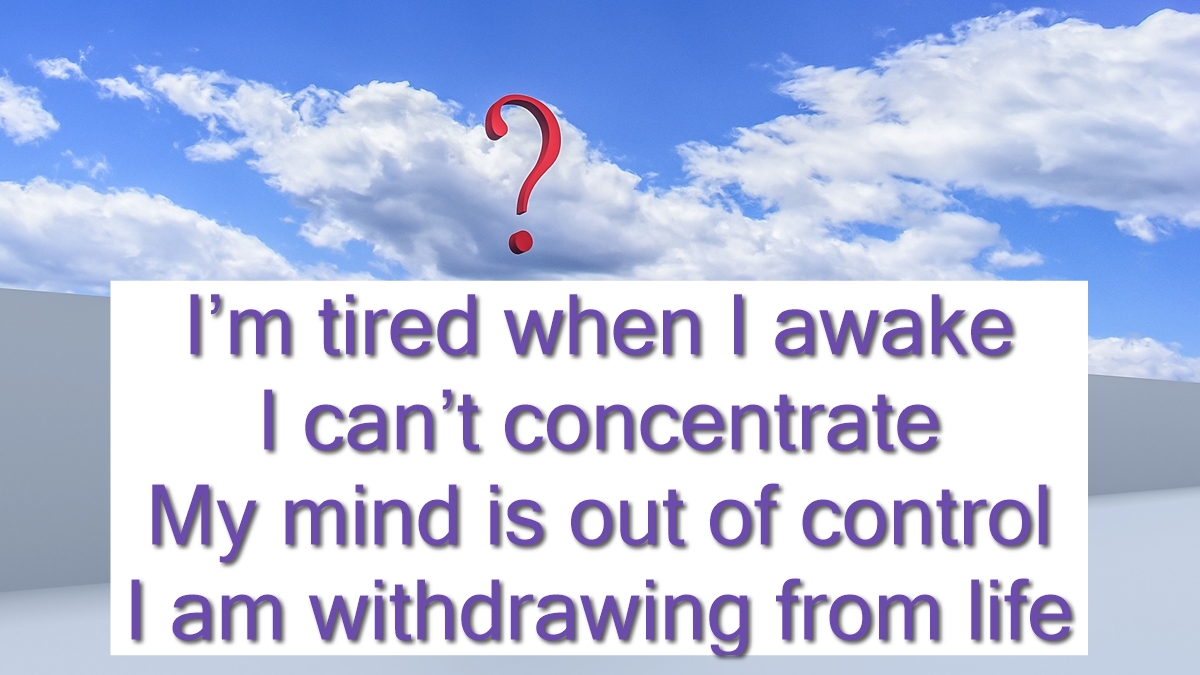Depression Test Questionnaire

There are many depression test questionnaires available. But be warned. Pretty well all of them will have the identical overwhelming disadvantage. This is that these depression test questionnaires are not supported by a credible explanation of what causes depression in the first place.
The absence of a clear understanding of depression is immediately evident by a basic Google search for what is depression. All you will see is long lists of symptoms and half baked theories.
A critique of these useless long lists of depression symptoms.
The questionnaire on this website is based on the understanding and insight of the Human Givens approach.
Human Givens explains depression
You can take the depression test questionnaire now.
The four critical questions answered in this Depression Test Questionnaire
One: How tired are you when you awake?
Tonight you will dream, even if you don’t remember doing so. And what is going on is that your brain will act out in story-like form the hopes, fears and reflections that occupied your mind today. Today’s concerns are tonight’s dreams. In simple terms, dreaming is our brain’s emotional flush toilet. This extraordinary process refreshes our emotional brain, leaving it better prepared to deal with tomorrow’s stresses.
People sink into a depressed mood when their innate physical or emotional needs are not being met and, instead of dealing with this situation, they begin to worry about it and so misuse their imagination. All depressed people worry. This increases the amount of dreaming they do, upsetting the balance between slow-wave, recuperative sleep and high-energy dream sleep. Soon they start to wake up feeling tired and unmotivated. This makes them worry even more.
This is why tiredness, particularly in the morning when waking is the classic symptom of depression and a key motivation of the depression test questionnaire.
Two: Can you concentrate and remember well?
If one is dreaming too much then slow-wave restorative sleep is squeezed. A consequences is that the healthy functioning of mind begins to deteriorate. Notably, it becomes harder to concentrate, remember and problem solve. This can have a devastating effect on confidence levels, especially as there is no understanding as to why it is happening. Worrying further increases and so dreaming is an even greater part of sleep. And concentration and memory becomes even harder.
This is truly a vicious cycle. It is essential that this is successfully identified successfully by the depression test questionnaire.
Three: Does your mind feel out of control?
As negative thoughts expand, fuelled by exhaustion and falling levels of concentration and remembering, depressed people find that their capacity for action diminishes and more and more of their waking time is spent thinking black-and-white thoughts and worrying ceaselessly. Clients speak of their head filling up with useless thoughts from which it is impossible to escape. Their head becomes a burning room from which there is no escape, as a recovered depressed client memorably said.
There are a series of questions in the depression test questionnaire to identify the stability and balance of your mind.
Four: Are you withdrawing from life – friends, work, pleasures and so on?
Exhaustion takes over, confidence collapses and one’s head fills up with useless, obsessive thoughts. Depression will then lead to a dangerous withdrawing from vital aspects of healthy life. Many will retreat from friendships, relationships, hobbies and pleasures. Work will become harder and as effectiveness declines, so worries expand even further. “What is wrong with me” and “what can I do”, will become the silent, desperate unheard cry.
A needs audit to discover the extent of the withdrawal from life is part of the depression test questionnaire.